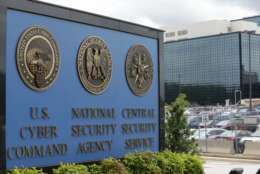Cybersecurity
-
In today's Federal Newscast, the National Security Agency is urging government contractors and other organizations to watch out for a new Russian cyber attack.
July 02, 2021 -
Alarmed by ransomware, the White House has been telling the private sector to get serious about cybersecurity.
July 01, 2021 -
The ongoing ransomware attacks have everybody spooked. Congress and the Cybersecurity and Infrastructure Security Agency are both contemplating ways to get industry to do something they've supposedly been doing for years.
July 01, 2021 -
For some answers, Federal Drive with Tom Temin turned to the open source Linux Foundation.
June 30, 2021 -
Industry is concerned about an initiative under President Biden's executive order that could lead to requirements for a "software bill of materials."
June 29, 2021 -
Researchers at the Pacific Northwest National Laboratory have come up with a cybersecurity software tool that builds on the old notion of honeypots.
June 29, 2021 -
A last-minute modification to the request for proposals for a signature governmentwide acquisition contract has left industry a little shellshocked.
June 29, 2021 -
Although the CMMC certification is new for everyone, the requirement is already in effect, and has been since September 2020.
June 28, 2021 -
Ericom's Chase Cunningham joined host John Gilroy on this week's Federal Tech Talk to discuss the concept of zero trust.
June 28, 2021 -
Defense Innovation Unit cyber portfolio Deputy Director Patrick Gould said on behalf of cyber mission teams, his organization tested out two tools that advanced the use of deception approaches to stop hackers.
June 25, 2021 -
By embracing a zero trust architecture, agencies can have full visibility and control over their resources, ensuring the devices connecting from various physical locations are safe.
June 25, 2021 -
DoD's review of the Cybersecurity Maturity Model Certification is ongoing, but officials want to address small business concerns about compliance costs.
June 24, 2021 -
In today's Federal Newscast, when it came to the SolarWinds cyber attack, the private sector was in no better shape than the government to stop or block the attack.
June 23, 2021 -
A new survey from the IPC, an industry association representing electronic manufacturers, found nearly a quarter of all respondents said the cost and burden of CMMC may force them out of the defense industrial base.
June 21, 2021 -
When you think of space, you don't think of it as the frontline of cyber war, but that's not the case. Many important aspects of U.S. critical infrastructure are controlled from space, and could be vulnerable to cyber attacks from malicious hackers.
June 21, 2021












